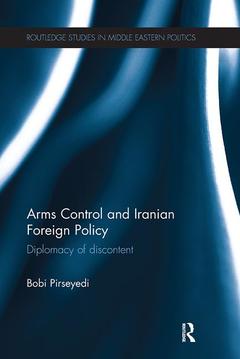Description
Arms Control and Iranian Foreign Policy
Diplomacy of Discontent
Routledge Studies in Middle Eastern Politics Series
Author: Pirseyedi Bobi
Language: English
Subject for Arms Control and Iranian Foreign Policy:
Keywords
diplomacy; iraq; war; representatives; international; nuclear; gulf; arab; sheikhdoms; operations; Arms Control Diplomacy; NAM; AEOI; West Germany; Nuclear Disarmament; International Arms Control; Gulf Arab Sheikhdoms; Arms Control Operations; Nuclear Arms Control; Iraq's Chemical Warfare; Conventional Arms Control; Iranian Representatives; Biological Arms Control; Iraq's Chemical; CWC Negotiation; Chemical Arms; IAEA Safeguard; Chemical Weapons; IAEA Full Scope Safeguard; Geneva Protocol; Iraq's Chemical Weapons; Cold War International System; President Khatami; Chemical Weapons Capability; Iran Iraq War
Approximative price 53.83 €
In Print (Delivery period: 14 days).
Add to cartPublication date: 05-2017
· 15.6x23.4 cm · Paperback
Approximative price 172.36 €
In Print (Delivery period: 14 days).
Add to cartPublication date: 08-2012
276 p. · 15.6x23.4 cm · Paperback
Description
/li>Contents
/li>Readership
/li>Biography
/li>
Since 2003, when the world learned that the Islamic Republic of Iran had succeeded in secretly developing a capability to enrich uranium and separate plutonium, the question of Iran?s nuclear program has ranked high on the international political and arms control agenda. This book studies the IRI?s diplomatic operations in the issue area of arms control and demonstrates how arms control diplomacy has formed an integral part of the IRI?s foreign policy during the various phases of its history. Furthermore, it fills a gap in the research literature on Iran?s foreign and security policies by providing the first comprehensive account of Iranian arms control diplomacy under the Islamic regime.
This book aims at reconstructing Iran?s diplomatic operations in four distinct thematic areas of arms control: conventional, chemical, biological, and nuclear arms control. It also looks at the diplomatic means by which the IRI?s leadership has tried to achieve its arms control objectives. This text also seeks to identify and examine the individual objectives that have guided Iranian policy choices in the domain of arms control. Finally, it places the reconstructed Iranian objectives into a broader context by elaborating on the fundamental values or foreign policy goals that the IRI?s arms control objectives have served.
This highly informative and thought provoking volume will be valuable reading for students, researchers and academics, as well as for commentators and policy-makers interested in Middle East studies, Iranian studies, international relations and arms control.
Introduction Part 1: Conventional Arms Control 1. Islamic Iran and the Shah’s Military Legacy 2. Arms Control in the Context of War: The Iran--Iraq Conflict 3. From the Cease-Fire to Global Security Networking Part 2: Chemical and Biological Arms Control 4. Iraqi Chemical Threat 5. Iran’s Post-War Chemical Diplomacy 6. Islamic Iran and Biological Arms Control Part 3: Nuclear Arms Control 7. Formation of a Diplomatic Approach 8. From the Cease-Fire to the Test-Ban Treaty 9. From the Test-Ban to Iran’s Signing of the Additional Protocol Conclusion Epilogue: the Ahmadinejad Era
Bobi Pirseyedi is an independent scholar, having completed a PhD in Middle East Studies at the University of Durham.




